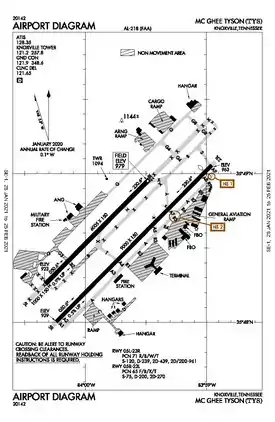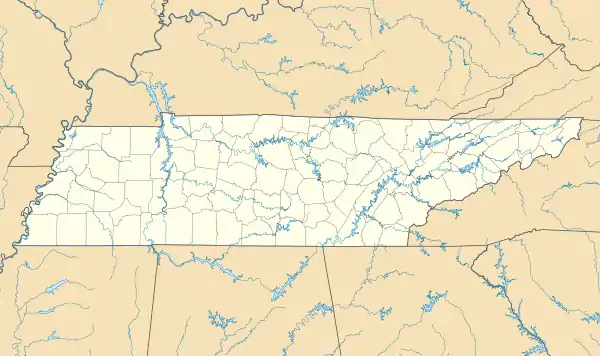McGhee Tyson Airport
McGhee Tyson Airport (IATA: TYS[2], ICAO: KTYS, FAA LID: TYS) is a public/military airport 12 miles south of Knoxville,[3] in Alcoa, Blount County, Tennessee. It is named for United States Navy pilot Charles McGhee Tyson, who was killed in World War I.[4]
McGhee Tyson Airport McGhee Tyson Air National Guard Base | |||||||||||||||
|---|---|---|---|---|---|---|---|---|---|---|---|---|---|---|---|
 | |||||||||||||||
| Summary | |||||||||||||||
| Airport type | Public | ||||||||||||||
| Owner | Metropolitan Knoxville Airport Authority | ||||||||||||||
| Serves | Knoxville, Tennessee | ||||||||||||||
| Location | Alcoa, Tennessee, U.S. | ||||||||||||||
| Opened | 1937 | ||||||||||||||
| Focus city for | Allegiant Air | ||||||||||||||
| Elevation AMSL | 979 ft / 298 m | ||||||||||||||
| Coordinates | 35°48′40″N 083°59′38″W | ||||||||||||||
| Website | http://www.flyknoxville.com | ||||||||||||||
| Maps | |||||||||||||||
 FAA Airport Diagram as of January 2021 | |||||||||||||||
 TYS  TYS | |||||||||||||||
| Runways | |||||||||||||||
| |||||||||||||||
| Statistics (2019) | |||||||||||||||
| |||||||||||||||
Sources: McGhee Tyson Airport[1] | |||||||||||||||
Owned by the Metropolitan Knoxville Airport Authority, it is served by several major airlines and employs about 2,700 people.[5] It is a 30-minute drive to the Great Smoky Mountains National Park.[6] The airport is the home of McGhee Tyson Air National Guard Base, an air base for the 134th Air Refueling Wing (134 ARW) of the Tennessee Air National Guard.
History
On August 1, 1930 the original McGhee Tyson airport opened, named for Charles McGhee Tyson. It was on 60 acres in West Knoxville. In 1935 the city purchased 351 acres in Blount County for the current airport. On July 29, 1937 an American Airlines Stinson Trimotor (about 10 seats) touched down, the first airline flight; before that, American's Stinsons landed at Island Airport on Dickinson Island east of town. The 1938 directory shows a 3100-ft N-S runway and a 4200-ft NE-SW runway at McGhee Tyson;[7] the 1939 directory shows 4000 ft N-S and 5000 ft NE-SW. The city built a control tower in 1941.
The development of TYS helped the City of Alcoa diversify its economy and gain its economic independence from what is today Alcoa Inc., the world's third largest producer of aluminum.[8] Alcoa Inc. built one of its production plants in Alcoa because of the proximity of dams along the Little Tennessee River which were a hydroelectric energy source for the production of aluminum.[8]
In 1951 the United States Air Force built several facilities on the field and 7,500-foot (2,300 m) runway 5L. The Federal Aviation Administration (FAA) added an Instrument Landing System to runways 5L and 23R in 1959. In 1961, with financing by the Tennessee Air National Guard, runway 5L was extended to 9,000 feet (2,700 m). The first scheduled airline jets were Delta DC-9s in December 1965.
In 1968 McGhee Tyson built a new air cargo facility; a new passenger terminal opened in 1974, a few years after runway 18/36 closed. Four years later the Metropolitan Knoxville Airport Authority (MKAA) was established. In 1990 runway 5R/23L was rebuilt to 9,000 feet. In 1992 the airport authority built a new 21-acre cargo facility on the north side of the airport for Federal Express, UPS and Airborne Express. Buildings were designed to meet the carriers' needs; 90% of the air cargo operations are UPS and Federal Express. Cost of the project was estimated at $9.3 million.
In 2000 improvements to the passenger terminal were finished at a cost of $70 million, including two new concourses, 12 new gates, ticket counters, and a Ruby Tuesday restaurant. In 2002 an aircraft maintenance facility was built for Northwest Airlines, serving as their primary CRJ MRO facility.[9] The now-defunct ExpressJet Airlines built a heavy-maintenance hangar near the air cargo facilities for its fleet. In June 2009, a new food court was completed, featuring Starbucks, Quiznos, Cinnabon, and Zia locations.[10] The Zia location was replaced in April 2013 with an Uno Express Pizza.[11]
In November 2016 the agency that operates McGhee Tyson received a $27.9 million grant from the Federal Aviation Administration to complete the next phase of a multi-year runway expansion, the most expensive project the airport ever has undertaken.[12] The north runway, 5L/23R, is being lengthened to 10,000 feet. During the work, 3,000 feet of that runway were demolished while 6,000 feet remained open for small planes. Airliners still land on Runway 5R/23L, which will remain 9,000 feet long.[13]
Facilities
McGhee Tyson Airport covers 2,250 acres (911 ha) at an elevation of 979 feet (298 m). It has two parallel runways: 5L/23R is 6,005 by 150 feet (1,830 x 46 m) concrete, being lengthened to 10,000 feet (3,000 m) when completed by 2020 or 2021, while 5R/23L is 9,000 by 150 feet (2,743 x 46 m) asphalt.[3][14]
The fixed-base operator (FBO) at TYS is the Truman-Arnold Company (TAC Air). TAC Air first moved into TYS on April 1, 2005, when it purchased Knox-Air, which had operated in TYS since 1974. Then a month later, on May 5, 2005, TAC Air purchased the only remaining FBO, Cherokee Aviation, which had been in operation since 1954. TAC Air combined these two FBOs under their own name, and they have continued to be the sole supplier of aviation fuel for commercial, corporate and general aviation aircraft as well as leased hangar space at the airport ever since.
In 2017 the airport had 106,584 aircraft operations, averaging 292 per day: 43,598 general aviation, 21,450 air taxi, 20,271 military, and 21,265 airline. In 2017, 168 aircraft were based at the airport: 62 single-engine, 32 multi-engine, 35 military, 38 jet and 1 helicopter.[3]
TYS is home to a maintenance base for Endeavor Air. Crew bases for Allegiant Airlines and PSA Airlines (regional carrier for American). Delivery, maintenance and training centers for Cirrus Aircraft.
Terminal
McGhee Tyson Airport has two levels. The top level is accessed via the curbside drop off and the parking garage. The top level has ticket counters, security, gates, restaurants and shops. It is designed with a Smoky Mountain theme, complete with faux waterfalls and wood carvings of bears. The bottom level is used for car rental counters, two baggage claims, airline offices, and airport offices. There are 12 gates.
Airlines and destinations
Passenger
| Airlines | Destinations | Refs |
|---|---|---|
| Allegiant Air | Fort Lauderdale, Las Vegas, Orlando/Sanford, Punta Gorda (FL), Sarasota, St. Petersburg/Clearwater Seasonal: Austin, Baltimore, Boston, Chicago–Midway, Denver, Destin/Fort Walton Beach, Houston–Hobby, Myrtle Beach (begins June 26, 2021), Newark, Pittsburgh | [15] |
| American Eagle | Charlotte, Chicago–O'Hare, Dallas/Fort Worth, Miami, New York–LaGuardia, Philadelphia, Washington–National | [16] |
| Delta Air Lines | Atlanta | [17] |
| Delta Connection | Atlanta, Detroit, Minneapolis/St. Paul, New York–LaGuardia | [17] |
| Frontier Airlines | Denver Seasonal: Orlando | [18] |
| United Express | Chicago–O'Hare, Denver, Houston–Intercontinental, Newark, Washington–Dulles | [19] |
Cargo
| Airlines | Destinations |
|---|---|
| Ameriflight | Louisville |
| FedEx Express | Indianapolis, Memphis, Norfolk, Richmond |
| UPS Airlines | Louisville, Miami |
Statistics
Top destinations
| Rank | Airport | Passengers | Airline |
|---|---|---|---|
| 1 | Atlanta, Georgia | 114,620 | Delta |
| 2 | Charlotte, North Carolina | 83,820 | American |
| 3 | Dallas/Fort Worth, Texas | 62,590 | American |
| 4 | Chicago–O'Hare, Illinois | 52,220 | American, United |
| 5 | Orlando–Sanford, Florida | 42,390 | Allegiant |
| 6 | St. Petersburg, Florida | 33,120 | Allegiant |
| 7 | Denver, Colorado | 30,960 | Allegiant, Frontier, United |
| 8 | Houston–Intercontinental, Texas | 29,890 | United |
| 9 | Detroit, Michigan | 28,590 | Delta |
| 10 | Fort Lauderdale, Florida | 27,720 | Allegiant |
Airline market share
| Rank | Airline | Passengers | Share |
|---|---|---|---|
| 1 | Endeavor Air | 484,000 | 20.26% |
| 2 | Allegiant Air | 480,000 | 20.10% |
| 3 | PSA Airlines | 265,000 | 11.09% |
| 4 | Delta Air Lines | 208,000 | 8.71% |
| 5 | SkyWest Airlines | 196,000 | 8.19% |
| 6 | Other | 756,000 | 31.65% |
Accidents and incidents
- On March 12, 1992 a USAir Express Jetstream 31 crashed on landing after the pilot failed to lower the landing gear. There were no passengers aboard, but the 2 crew members were killed.[22]
References
- "Airport Statistics". McGhee Tyson Airport.
- "IATA Airport Code Search (TYS: Knoxville / McGhee Tyson)". International Air Transport Association. Retrieved December 27, 2012.
- FAA Airport Form 5010 for TYS PDF. Federal Aviation Administration. effective November 15, 2012.
- "History of the Airport". McGhee Tyson Airport. Archived from the original on May 13, 2008.
- "About McGhee Tyson Airport". Metropolitan Knoxville Airport Authority. Archived from the original on 2012-12-15.
- City of Alcoa, official website
- https://babel.hathitrust.org/cgi/pt?id=pst.000070955835&view=1up&seq=190
- City of Alcoa. "Welcome to the City of Alcoa / City of Alcoa - City of Alcoa". cityofalcoa-tn.gov.
- "Investor Relations - Corporate Profile". Pinnacle Airlines Corp. Archived from the original on 2012-07-12.
- Marcum, Ed (June 6, 2009). "Airport's food court opens". Knoxville News Sentinel.
- "Uno Express Pizza Opens". April 12, 2013.
- "McGhee Tyson Airport lands $27.9 million federal grant". Knoxville News Sentinel. Retrieved 2017-10-02.
- "Longer runway aims for longer reach". Knoxville News Sentinel. Retrieved 2017-10-02.
- Gaines, Jim (January 1, 2017). "Longer runway aims for longer reach". Knoxville News Sentinel. Retrieved December 18, 2017.
- "Allegiant Air". Retrieved 7 January 2017.
- "Flight schedules and notifications". Retrieved 7 January 2017.
- "FLIGHT SCHEDULES". Retrieved 7 January 2017.
- "Frontier".
- "Timetable". Retrieved 7 January 2017.
- "Knoxville, TN: McGhee Tyson (TYS)". Bureau of Transportation Statistics (BTS), Research and Innovative Technology Administration (RITA), U.S. Department of Transportation. February 2018. Retrieved May 21, 2018.
- "RITA BTS Transtats - TYS". www.transtats.bts.gov. April 2018. Retrieved July 20, 2019.
- "Knoxville-McGhee Tyson Airport". Aviation Safety Network.
 This article incorporates public domain material from the Air Force Historical Research Agency website http://www.afhra.af.mil/.
This article incorporates public domain material from the Air Force Historical Research Agency website http://www.afhra.af.mil/.
External links
| Wikimedia Commons has media related to McGhee Tyson Airport. |
- Official website
- 134th Air Refueling Wing
- FAA Airport Diagram (PDF), effective January 28, 2021
- FAA Terminal Procedures for TYS, effective January 28, 2021
- Resources for this airport:
- AirNav airport information for KTYS
- ASN accident history for TYS
- FlightAware airport information and live flight tracker
- NOAA/NWS weather observations: current, past three days
- SkyVector aeronautical chart for KTYS
- FAA current TYS delay information